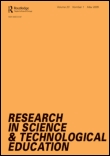
Research in Science & Technological Education
Scope & Guideline
Exploring New Frontiers in Science and Technological Learning
Introduction
Aims and Scopes
- Interdisciplinary STEM Education Research:
The journal emphasizes research that integrates science, technology, engineering, and mathematics, exploring how these disciplines can be taught cohesively to foster student engagement and understanding. - Teacher Education and Professional Development:
A core focus is on the preparation and ongoing professional development of educators, particularly in how they integrate innovative teaching practices and technology into their science curricula. - Student Learning and Engagement:
The journal investigates various factors influencing student learning outcomes, engagement, and attitudes towards science and technology, including the impact of pedagogical strategies and learning environments. - Curriculum Development and Evaluation:
Research on the design, implementation, and assessment of science curricula is a significant area, with an emphasis on inquiry-based and hands-on learning approaches. - Socio-scientific Issues and Community Engagement:
The journal addresses the interplay between science education and societal challenges, emphasizing the importance of equipping students with the skills to engage with socio-scientific issues in their communities. - Use of Technology in Education:
Research on the integration of digital tools and innovative technologies in science education, focusing on their impacts on teaching practices and student learning experiences.
Trending and Emerging
- Integration of Technology and Digital Tools:
There is a significant increase in research focused on the use of technology in education, particularly how digital tools can enhance learning experiences and support innovative teaching strategies in STEM. - Focus on Equity and Diversity in STEM Education:
Emerging themes include the exploration of equity, diversity, and inclusion in STEM education, emphasizing the need to address gender, socioeconomic, and cultural disparities in science learning. - Emphasis on Student-Centered Learning Approaches:
Research is trending towards student-centered pedagogies, such as inquiry-based learning, project-based learning, and collaborative learning, which actively involve students in their educational processes. - Exploration of Socio-scientific Issues:
There is a growing interest in how education can equip students to engage with socio-scientific issues, fostering critical thinking and decision-making skills relevant to real-world challenges. - Interdisciplinary and Collaborative Teaching Practices:
An emerging trend is the exploration of interdisciplinary approaches that combine different fields of study, promoting collaborative teaching practices among educators in various disciplines.
Declining or Waning
- Traditional Lecture-Based Instruction:
There has been a noticeable decline in research focused on traditional lecture-based teaching methods, as the journal increasingly emphasizes active learning strategies and inquiry-based approaches. - Basic Science Content Knowledge:
Research that solely focuses on content knowledge without considering pedagogical implications is becoming less frequent, as the journal shifts towards studies that connect content knowledge with teaching effectiveness and student engagement. - Generalized Assessments of Science Education:
There is a waning interest in broad assessments of science education effectiveness without context-specific insights; the focus has shifted towards more nuanced evaluations that consider diverse educational settings and student populations. - Single-Discipline Focus:
Research that isolates science education from technology or engineering contexts is decreasing, highlighting a trend towards interdisciplinary studies that encompass broader STEM education frameworks. - Quantitative Research Methods:
While quantitative studies remain valuable, there is a noticeable decline in purely quantitative approaches, with a growing preference for qualitative and mixed-methods research that provides deeper insights into educational practices.
Similar Journals
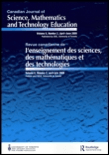
Canadian Journal of Science Mathematics and Technology Education
Elevating Educational Practices in STEM DisciplinesCanadian Journal of Science Mathematics and Technology Education (ISSN: 1492-6156; E-ISSN: 1942-4051) is a prominent publication by SPRINGER based in Switzerland, dedicated to exploring innovative methodologies and practices in the fields of science, mathematics, and technology education. Established in 2001 and continuing to 2024, the journal maintains a strong reputation within the academic community, reflected in its Q2 ranking in the Education category for 2023 and a commendable Scopus ranking that places it in the top 25% of journals within the social sciences education domain (Rank #383/1543). This journal serves as a critical platform for researchers, educators, and practitioners interested in the latest developments, research findings, and discussions pertaining to instructional strategies and curricular advancements. Although it is not open access, the journal's insights and contributions are invaluable for those aiming to elevate educational practices and address contemporary challenges in STEM education.
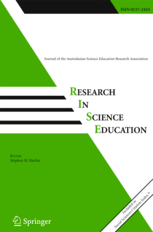
RESEARCH IN SCIENCE EDUCATION
Shaping Tomorrow’s Science Educators TodayRESEARCH IN SCIENCE EDUCATION is a premier journal published by Springer, esteemed in the field of education, particularly focused on science education research. With an ISSN of 0157-244X and an E-ISSN of 1573-1898, the journal enjoys an exceptional standing, reflected in its Q1 category ranking within Education for 2023 and a notable Scopus rank of #165 out of 1543 in the Social Sciences and Education domain, placing it in the 89th percentile. This commitment to quality and impact underscores the journal's role in disseminating cutting-edge research, innovative teaching strategies, and effective learning practices that shape the future of science education. Researchers, educators, and students will find invaluable insights and a wide range of topics that cater to their interests in advancing the pedagogy and practice of science teaching and learning. Published in the Netherlands, RESEARCH IN SCIENCE EDUCATION provides a vital platform for those seeking to contribute to and engage with the evolving landscape of science education.
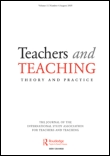
Teachers and Teaching
Exploring the Dynamics of Teaching and LearningTeachers and Teaching is a premier scholarly journal published by Routledge Journals, Taylor & Francis Ltd, providing an essential platform for researchers, educators, and practitioners in the fields of Education and Arts and Humanities. With an editorial focus on the dynamics of teaching and learning, the journal aims to share innovative research and insightful discussions that enhance pedagogical practices and policy development. Notably, it has achieved a Q1 ranking in both the Arts and Humanities and Education categories, signifying its impact and relevance in educational research, as reflected in its Scopus rankings, with an 84th percentile for Arts and Humanities and a 76th percentile in Education. Although it does not offer open access, the journal provides extensive access options for libraries and institutions, making its rich content available to a wide audience. Spanning from 1995 to 2024, Teachers and Teaching continues to set the standard for high-quality scholarship in the evolving landscape of education, inviting contributions that explore challenges and innovations in teaching methodologies.

International Journal of Instruction
Illuminating the path to effective instructional strategies.International Journal of Instruction is a distinguished peer-reviewed journal dedicated to advancing the field of education through high-quality research and innovative instructional practices. Published by GATE Association for Teaching & Education in Switzerland, this open-access journal has been a beacon of knowledge since its inception in 2008, ensuring that impactful educational research is freely accessible to scholars, educators, and practitioners worldwide. With an impressive Q2 ranking in Education and a notable position in the 80th percentile within its category in Scopus, the journal showcases cutting-edge studies and discussions that reflect current trends and methodologies in teaching and learning. The scope of the journal includes a wide array of topics, ranging from instructional strategies to curriculum development, making it a vital resource for anyone engaged in the dynamic landscape of education. Explore the International Journal of Instruction today to contribute to and benefit from the collective wisdom of the global educational community.
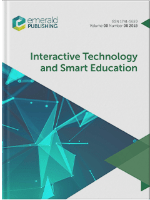
Interactive Technology and Smart Education
Discovering the future of education, one article at a time.Interactive Technology and Smart Education is a leading academic journal published by EMERALD GROUP PUBLISHING LTD, dedicated to exploring the dynamic intersection of technology and education. With a robust impact factor signifying its significant contributions to the field, this journal consistently ranks in the Q1 quartile in categories such as Computer Science (Miscellaneous), Education, and E-learning, reflecting its prestige and wide-ranging influence. A staple for researchers, educators, and industry professionals, the journal addresses innovative practices and developments in interactive technologies that enhance teaching and learning experiences. Operating from its base in the United Kingdom, the journal spans nearly two decades of impactful publishing, featuring high-quality research that plays a crucial role in shaping the future of education through technology. Scholars seeking to stay at the forefront of this evolving field are encouraged to contribute and engage with the journal's pioneering work.

Science & Education
Advancing educational excellence through rigorous research.Science & Education is a prestigious journal published by Springer, dedicated to advancing the field of education through high-quality research and innovative practices. With its ISSN 0926-7220 and E-ISSN 1573-1901, this journal has established a significant impact in the academic community, evidenced by its Q1 ranking in the Education category and an impressive Scopus ranking of 203 out of 1543, placing it within the 86th percentile of education-related journals. Operating from the Netherlands, this journal provides a platform for rigorous scholarship aimed at enriching educational theory and practice, accommodating diverse educational disciplines. While it offers traditional access, its vast array of research, reviews, and theoretical discussions fosters collaboration among researchers, educators, and policymakers. With years of continuous publication from 1992 to 2024, Science & Education remains at the forefront of educational research, making it an essential resource for anyone invested in the world's educational advancements.
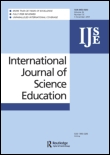
INTERNATIONAL JOURNAL OF SCIENCE EDUCATION
Exploring New Frontiers in Science PedagogyINTERNATIONAL JOURNAL OF SCIENCE EDUCATION, published by Routledge Journals, Taylor & Francis Ltd, is a leading academic journal that plays a pivotal role in the field of science education. Established in 1987, this esteemed journal aims to advance the understanding of educational processes and practices in the sciences, showcasing innovative research that intersects pedagogy, curriculum development, and educational policy. With a prestigious Q1 ranking in Education for 2023 and an impressive Scopus rank of 304 out of 1543 in the Social Sciences Education category, the journal represents the top tier of scholarly impact and influence. Although it is not an open-access journal, the findings and insights shared within its pages are of paramount importance for researchers, educators, and policymakers striving to enhance science learning in diverse educational contexts. With a commitment to excellence and a vision to inform and inspire, the INTERNATIONAL JOURNAL OF SCIENCE EDUCATION is a vital resource for anyone dedicated to the future of science education.

Journal of Science Education and Technology
Bridging Science and Technology for Enhanced Learning.The Journal of Science Education and Technology, published by SPRINGER, stands as a premier platform in the fields of education and engineering, recognized with a prestigious Q1 ranking in both categories as of 2023. With an ISSN of 1059-0145 and an E-ISSN of 1573-1839, this journal serves as a pivotal resource for researchers, educators, and practitioners alike, emphasizing the integration of scientific inquiry and technological advancements in educational contexts. Since its inception in 1992, the journal has consistently provided high-quality, peer-reviewed research that shapes contemporary practices and methodologies in science education. With its notable Scopus rankings, including a 95th percentile in Social Sciences Education, the journal is essential for anyone eager to enhance their understanding of effective teaching in STEM fields. While the journal is not open access, its contributions are invaluable to advancing knowledge and innovations that are crucial for the progressive education landscape, making it a must-read for scholars and students committed to excellence in science education.

Asia-Pacific Science Education
Fostering Excellence in Science Teaching and LearningAsia-Pacific Science Education is a leading academic journal dedicated to advancing the field of science education across the Asia-Pacific region. Published by BRILL, this Open Access journal has been available to the global research community since 2015, ensuring that vital scientific educational discoveries and methodologies reach a broad audience without barriers. With an impressive Scopus rank of #869 in the Social Sciences Education category and classified in the Q2 quartile for 2023, the journal showcases high-quality research that pushes the boundaries of teaching and learning in science disciplines. Scholars, educators, and policymakers alike can benefit from its rigorous analyses and innovative practices aimed at enhancing science education practices and policy in diverse contexts, making it an invaluable resource for driving academic excellence and informed decision-making in education.
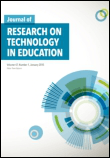
Journal of Research on Technology in Education
Exploring the Future of Learning through Technology.The Journal of Research on Technology in Education is a premier academic publication dedicated to exploring the intersection of technology and education. Published by ROUTLEDGE JOURNALS, TAYLOR & FRANCIS LTD, this journal stands at the forefront of educational research, boasting impressive Q1 rankings in both Computer Science Applications and Education for 2023. With an ISSN of 1539-1523 and an E-ISSN of 1945-0818, it is recognized in the Scopus database, ranking 31st out of 1543 in the field of Education, placing it in the 98th percentile, and 73rd out of 817 in the domain of Computer Science Applications, within the 91st percentile. The journal is committed to publishing high-quality research that informs practice and policy, with a scope that covers innovative uses of technology in educational settings from its inception in 2001 through 2024 and beyond. It is an essential resource for researchers, educators, and policymakers looking to harness the potential of technology in enhancing teaching and learning experiences.